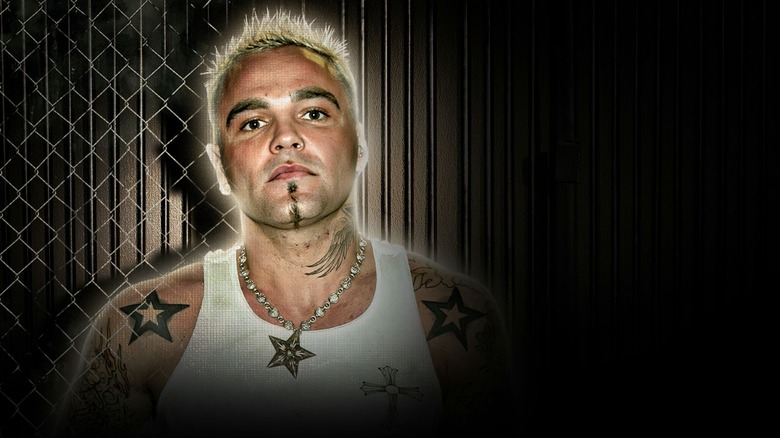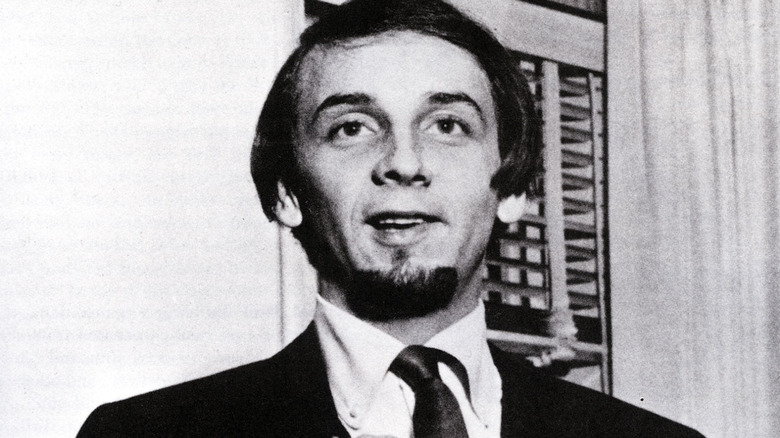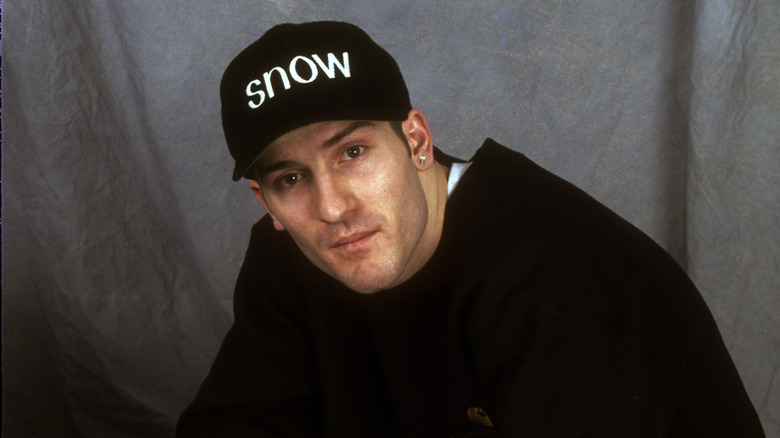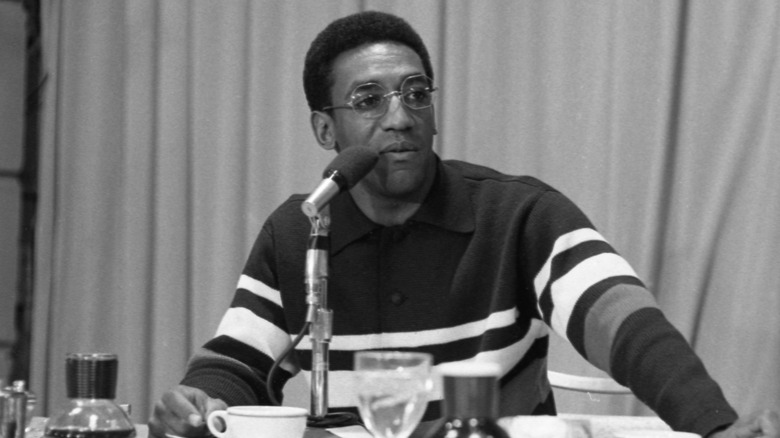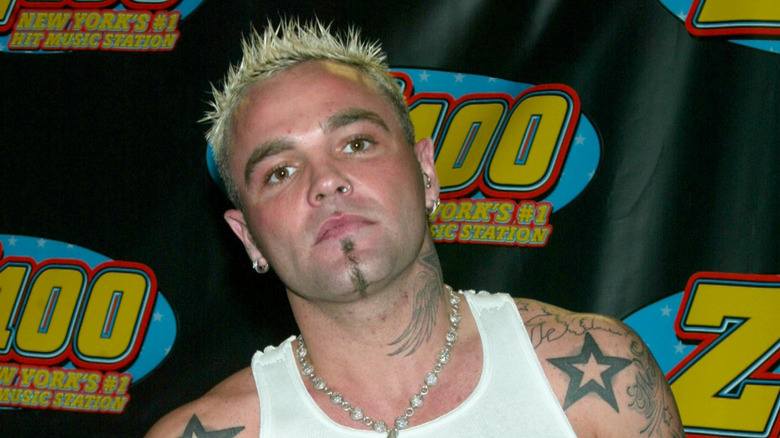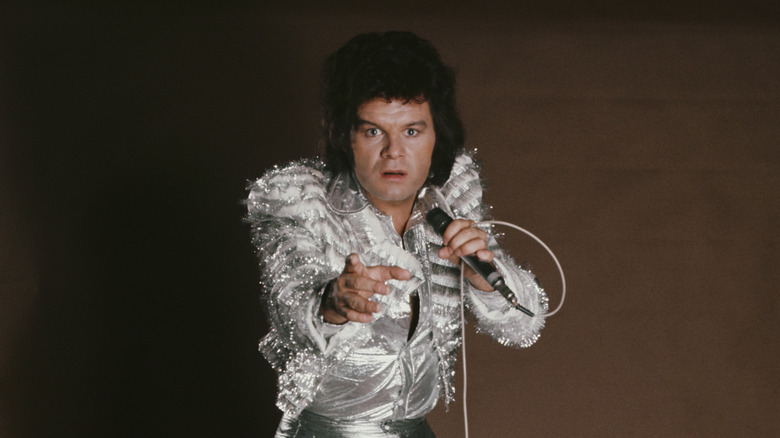One-Hit Wonders Who Went To Prison
Pop music history is filled with stories of all sorts of performers who ever-so-briefly captivated audiences with their music, only to disappear soon after their big hit single fell off the charts. These artists are commonly known as one-hit wonders, and while many of them went on to live quiet, low-profile lives after their hitmaking days, there are also those whose rather checkered personal histories include a stint or two (or more) in prison.
Sometimes, it's a case of a promising career derailed by an extended stay at the clink, but there are also instances of one-hit wonders running afoul of the law well after their heyday. Then there are also feel-good stories of one-hit wonders with criminal records who found their way to the straight and narrow thanks to their music.
The definition of "one-hit wonder" can often differ from one source to the next. But for the purposes of this list, we're looking at solo performers or prominent members of bands who either had only one Top-40 hit on the U.S. Billboard pop charts (aka the Hot 100), had a couple of Top-40 hits but only one that most people remember to this day, or failed to crack the Top 40 but did extremely well on a niche chart, e.g. Billboard's rock, rap, or alternative charts. With that out of the way, let's look at those one-hit wonders who did — or are still doing — time behind bars.
Rolf Harris
While much better known in the United Kingdom and his home country of Australia, singer, artist, and children's entertainer Rolf Harris briefly made his mark stateside with the novelty song "Tie Me Kangaroo Down, Sport," which peaked at No. 3 on the Billboard Hot 100 in July 1963. The song would earn controversy decades after the fact as one of the verses contains lyrics perceived as racist against Aboriginal people, but Harris faced far more scrutiny in his later years for unspeakable actions he allegedly committed against multiple women, most of them underage at the time the incidents took place.
In 2014, after joining the growing list of children's entertainers arrested for serious crimes, Harris was found guilty on 12 counts of indecent assault, with the allegations dating as far back as the late '60s, when he purportedly touched a young girl inappropriately after she asked him for his autograph. He was also accused of grooming and repeatedly assaulting his daughter Bindi's childhood friend, mostly while she was still in her early teens.
All in all, Harris was sentenced to five years and nine months in prison, and he faced even more indecent assault charges while behind bars, though he was released in May 2017 while awaiting retrial on three of the newer charges. Harris died on May 10, 2023, at the age of 93, his once-outstanding reputation forever besmirched by the crimes he supposedly committed.
Silento
Many one-hit wonders achieved their one major success in their teens, and Ricky Hawk, better known as Silentó, was a classic example of such. The young rapper was only 17 years old when his song "Watch Me (Whip/Nae Nae)" became a No. 3 hit in the summer of 2015. It helped that the track had all the ingredients of the typical earworm; a catchy hook, extremely repetitive and simple lyrics, and social media virality. But as is often the case with artists who make it big with that one viral hit, Silentó had trouble catching lightning in a bottle a second time around, and five years after he became an overnight sensation, he was making the news more often for his legal issues than his latest music.
Silentó was arrested in September 2020 for two separate cases of domestic violence and assault with a deadly weapon, and he faced up to six years in prison if found guilty of those crimes. However, he found himself in much bigger trouble with the law just a few months later. The rapper was taken into custody at the DeKalb (Georgia) county jail and held without bond in February 2021, following his alleged involvement in the murder of his cousin Frederick Rooks on January 21 of that year.
In August 2021, Silentó was indicted on multiple charges, including malice murder and felony murder, though there have been no other significant developments in his case as of April 2025.
Howie Day
It may have taken some time, but Howie Day's 2004 single "Collide" became a sizeable hit on the Billboard Hot 100, reaching its peak position of No. 20 in June 2005, slightly more than one year after its release. On the surface, the young musician from Maine had a lot of promise, with an ostensibly squeaky-clean image and radio-friendly breakout hit that also made it to an episode of "One Tree Hill." But he had actually spent some time in jail shortly before achieving nationwide stardom; in March 2004, Day was arrested following a performance in Madison, Wisconsin, after locking a female fan in the bathroom of his tour bus for refusing his sexual advances and breaking another woman's cell phone when she tried to call the police.
As it turned out, Day's time as a hitmaking singer-songwriter was momentary, as "Collide" was his only song to crack the Hot 100. But the unpleasant incidents didn't stop with the arrest in Madison; in 2005, he was arrested at Boston's Logan International Airport after acting belligerently on a flight, and in the late 2010s, he racked up two more arrests, both for domestic violence-related charges against two separate women. For the latter incident, he claimed to be suffering from Xanax withdrawal as police officers took him into custody.
Ian Watkins (Lostprophets)
Welsh rock band Lostprophets may not have cracked the Top 40 of the U.S. pop charts, but they were nonetheless well-known outside their genre in the early-to-mid-2000s. Much of this was thanks to "Last Train Home," which was their only Billboard Hot 100 entry, peaking at No. 75 in May 2004 but also topping the trade magazine's Alternative Airplay charts. Unfortunately, the first thing most people think about when the name Lostprophets is mentioned these days isn't the band's music but rather the sordid actions of their frontman, Ian Watkins.
Watkins was arrested in December 2012 for conspiring to sexually assault an underage girl, as well as a variety of other charges, mostly related to child pornography. After initially denying the charges, he eventually pleaded guilty to most of them and was sentenced to 35 years in prison in December 2013. Also sentenced were two unnamed women who purportedly sexually abused their children per Watkins' request; they received 14 years and 17 years for conspiring with the singer.
Speaking to The Guardian, Detective Chief Inspector Peter Doyle, who worked on the Watkins case, had some choice words for the disgraced rocker following his sentencing. "It's as if he just doesn't care," Doyle said. "He has shown no remorse at any time. In my view, that potentially makes him the most dangerous sex offender I have ever seen."
Arthur Lee (Love)
Armed with a wide range of influences, Los Angeles-based band Love combined psychedelia, jazz, folk, and rock 'n' roll while standing out as one of the first notable racially integrated rock groups. And while they only cracked the Top 40 once, with the ultra-fast-paced proto-punker "7 and 7 Is" hitting No. 33 in September 1966, both the song and the first three albums Love released in the 1960s would go on to become cult favorites with fans and fellow musicians alike.
As the years passed, frontman Arthur Lee remained the sole constant member of Love, as lineup changes, drug use among members, and an inability to live up to the critical acclaim of their initial releases kept them off the singles charts after the moderate success of "7 and 7 Is." By the 1980s, Lee was knee-deep in legal trouble, serving time behind bars for arson and auto theft; the iconic musician's financial woes were also so severe in the early '90s that he had to sell half of his publishing catalog. In 1995, he was sentenced to 12 years in prison for firing a gun outside his LA apartment but only served half of his sentence. He resumed touring under the Arthur Lee and Love banner soon after his release, and died of leukemia just five years later at the age of 61.
Bobby Shmurda
Bobby Shmurda achieved fame at quite a young age, with his 2014 single "Hot N****" (also known as "Hot Boy") hitting No. 6 on the Billboard Hot 100 just a few months after his 20th birthday. However, the rapper, real name Ackquille Pollard, lived a chaotic life outside the recording studio, as he was allegedly part of a gang called GS9 that had been linked to several drug-related crimes and shootings in the Brooklyn area.
He was arrested in December 2014, along with several other purported gang members, and was facing a potential sentence of 25 years to life for conspiracy and weapon charges. In 2016, Shmurda pleaded guilty to one count each of conspiracy and possession of a weapon and accepted a seven-year plea deal along with fellow rapper Rowdy Rebel and another defendant.
Shmurda was released in February 2021 and, in an interview with GQ, admitted that he was inspired to take better care of his rap career by the fan mail he received while in jail. "I didn't really care too much for it until I went to jail and I [saw] how the fans were loyal," he told the outlet. "I can't name a week that I didn't see at least 10 [pieces] of fan mail, throughout the whole bid." He has yet to return to the pop charts since his release, but at 30 years old at the time of writing, Shmurda still has lots of time to become more than just a one-hit wonder on the pop charts.
Phil Spector (The Teddy Bears)
Years before Phil Spector became the eccentric genius whose "Wall of Sound" production helped define American pop music in the 1960s, he was a backup singer and guitarist in a group called the Teddy Bears, which spent three weeks at No. 1 in late 1958 with the song "To Know Him Is to Love Him." That was their only hit single of note, as two other tracks barely scratched the bottom of the Hot 100 in 1959.
It wasn't long, however, before Spector earned his reputation as a hotshot producer – he was, in fact, dubbed the "Tycoon of Teen" for his ability to tap into the musical zeitgeist. On the other hand, his notoriously difficult personality and insistence on full creative control made him a pain to work with for several musicians, including Paul McCartney, who had a rough time working with Spector on the Beatles' final studio album, "Let it Be."
The ugly side of Spector's personality also reared its head away from the studio, as his late ex-wife Ronnie Spector openly shared harrowing tales of his abusive behavior in multiple interviews. And if anyone had doubts that the volatile producer was capable of killing someone, they were mostly erased in 2003 when he was arrested for the murder of actor Lana Clarkson, who was found dead at his mansion with a gunshot wound. In 2009, Spector was sentenced to 19 years to life for Clarkson's murder, and he was still serving time when he died in January 2021 at the age of 81.
Snow
Vanilla Ice wasn't the only white rapper making big waves on the pop charts in the early '90s. A few years after the Iceman somehow turned the bass line of Queen and David Bowie's "Under Pressure" into a No. 1 hit, Snow (real name Darrin O'Brien) enjoyed a whopping seven-week reign on top of the Billboard Hot 100 with "Informer." More than three decades later, many people are still trying to figure out the meaning of "I lick he boom-boom down" in the song's chorus. But there's a far more serious origin story behind the 1993 single, one that stems from the Canadian rapper/reggae musician's time behind bars before his rise to fame.
Speaking to The Washington Post in April 1993, Snow opened up about his criminal past, confirming that his smash hit was indeed about an incident that landed him in prison for eight months on attempted murder charges. Although he was ultimately acquitted, he was back in jail for his involvement in a bar brawl and was freed in January 1993 after serving about two-thirds of his one-year sentence. Snow also admitted that his legal issues mostly stemmed from his heavy drinking. "Alcohol is what got me in trouble," he told The Washington Post. "I used to drink a lot, but I gave it up. Drinking makes me stupid."
Snow may be widely considered a one-hit wonder, but unlike the aforementioned Vanilla Ice and his post-fame arrest record, he has thankfully remained on the good side of the law in the years since his brief brush with pop superstardom.
Bill Cosby
Aside from his well-documented resume as an actor and comedian, Bill Cosby was also a recording artist, having released several albums of comedy and music, primarily in the '60s and '70s. He also had a few songs crack the Billboard Hot 100, including 1967's "Little Ole Man (Uptight-Everything's Alright)," which combined Cosby's half-spoken, half-sung tales about the song's titular character with background vocals from Stevie Wonder's then-recent hit "Uptight (Everything's Alright)." That song peaked at No. 4, making it the entertainer's biggest hit by far and his only foray into the Top 40.
Of course, Cosby was no one-hit wonder when it came to television and movies alike, and by the early 2000s, he was still fondly remembered as "America's Dad" from his time playing Dr. Cliff Huxtable on "The Cosby Show." However, it wasn't long before he started facing accusations of sexual abuse, mainly from Andrea Constand, who worked as the director of operations for the women's basketball team of Temple University, Cosby's alma mater.
As the years passed, at least 60 other women came forward with allegations of abuse against Cosby, and in September 2018, almost 14 years after Constand filed a police report against the actor-comedian, he was sentenced to three to 10 years in prison without bail. He was freed on June 30, 2021, after the Pennsylvania Supreme Court overturned his conviction, but faced even more sexual assault allegations when five women filed a lawsuit against him in December 2022.
Shifty Shellshock (Crazy Town)
Thanks to a bass line and guitar licks sampled from a Red Hot Chili Peppers instrumental and an insistently simple, sing-along chorus, Crazy Town's "Butterfly" flew to the top of the Billboard Hot 100 in March 2001, staying there for two non-consecutive weeks. Considering how different it was from the rap-rock act's usual, heavier fare, it shouldn't be too surprising that "Butterfly" was their only hit on the pop charts, or that their second album didn't even crack the upper half of the Billboard 200 after the first one peaked at No. 9.
Fleeting mainstream success aside, Crazy Town had quite a troubled history as a band, much of it on account of their frontman, Seth "Shifty Shellshock" Binzer. As a teenager, Shellshock spent three months in prison after an unsuccessful attempt to rob a fellow drug dealer. He also dealt with substance use issues for much of his adult life; these were on full display when he was featured in the first two seasons of "Celebrity Rehab with Dr. Drew." In 2012, Shellshock was arrested for cocaine possession and domestic violence, and in the early 2020s, he was racking up multiple DUI arrests as well. He was only 49 years old when he died on June 24, 2024, from an accidental drug overdose.
Gary Glitter
Even if you don't know the artist behind the song, you've most likely heard it playing at sporting events — a mostly lyric-less stomper of a tune punctuated by emphatic shouts of "Hey!" serving as the chorus hook. The song in question is, of course, Gary Glitter's "Rock and Roll Part 2," which spent two weeks at No. 7 on the Billboard Hot 100 in September 1972 and remained a favorite among sports fans in the decades that followed. Sure, Glitter had another Top-40 hit later that year, but good luck finding someone under the age of 50 who remembers or recognizes "I Didn't Know I Loved You (Till I Saw You Rock and Roll)."
With his one-hit wonder status established, it's important to note that Glitter, real name Paul Gadd, is no longer remembered primarily for his time as a glam rock pioneer. Appearing in court in 1999, the musician admitted to repeatedly downloading sensitive images of children and was sentenced to four months in jail. In 2006, he was convicted of sexually abusing two underage girls and while he maintained his innocence, he received a three-year prison sentence for those crimes.
Glitter was then given a 16-year sentence in 2015 after he was found guilty of abusing three other girls between 1975 and 1980, and sent back to prison for violating his license conditions just six weeks after his February 2023 release.
If you or anyone you know has been a victim of sexual assault, needs help with addiction issues, or is dealing with domestic abuse, contact the relevant resources below:
-
The Rape, Abuse & Incest National Network website or contact RAINN's National Helpline at 1-800-656-HOPE (4673).
-
The Substance Abuse and Mental Health Services Administration website or contact SAMHSA's National Helpline at 1-800-662-HELP (4357).
-
The National Domestic Violence Hotline at 1−800−799−7233. You can also find more information, resources, and support at their website.
